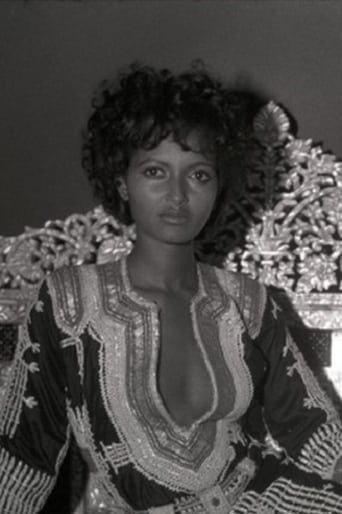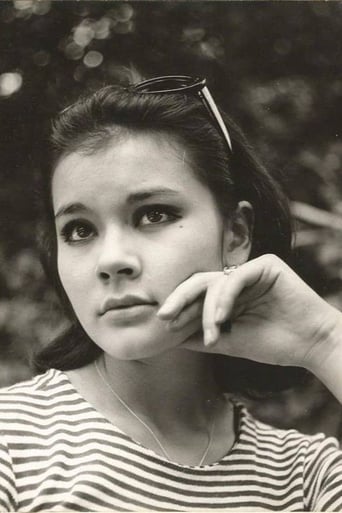Vashirdfel
Simply A Masterpiece
Pluskylang
Great Film overall
Odelecol
Pretty good movie overall. First half was nothing special but it got better as it went along.
Kaelan Mccaffrey
Like the great film, it's made with a great deal of visible affection both in front of and behind the camera.
Bene Cumb
Similar to the Bible or most of epics, it is impossible to create some smooth and comprehensive work of art from Arabian Nights. It is a bunch of stories of different eras and angles and places of actions lie thousands of kilometers from each other. Pasolini has taken some hectic picks, invited plump women and skinny men (incl. his own lover) and made a loosely combined film where male bodies have full nudity as well, if required (would be interesting to know how the director made those teens and young people to perform so naturally). The 2 hours seems a bit long though, i.e. 1st half of the film is more dynamic and catchy. But the background and habits of the Arab past is well expressed, and Pasolini himself is less profound or less degenerated as usual :)
Falconeer
Resembling something out of an obscure dream, the characters from the ancient tales of the 1,001 Nights come to life in a dizzying spectacle of natural beauty, natural light, and the most breathtaking landscapes ever committed to film. Sumptously filmed throughout the exotic locales of Yemen, Ethiopia,Iran, and as far as Nepal, we are introduced to the story's hero, the sweet and innocent Nur Ed Din, played by the exotically beautiful Franco Merli, (Salo: 120 Days of Sodom.) While in the marketplace, Nur Ed Din encounters the enchanting Zumurrud, a feisty slave girl, being sold at auction. The girl has a spirit of her own and is given permission to choose who her next master shall be. Turning down generous offers from rich old men, she instead selects the young shepherd boy, Nur Ed Din, who is delighted to bring his new slave back to his home. He has not one dinar, but this matters not to Zumurud, who shows the boy the mysteries of eroticism. Of course Zumurud is stolen away after he ignores a prophetic warning from his slave, not to do business with a blue-eyed Christian. A greatly heart-broken Nur Ed Din embarks on an adventure to find his lost love, and this adventure is the centerpiece of this enormous, sweeping film. During his travels he meets many people, who all have their own tales to tell, thus taking the boy on still further adventures, where he encounters genies, giants, Princes, and heart-broken men in search of their lost loves. There are sequences in this film that are so beautiful that they induce chills, such as when Zumurud comes upon the kingdom in the desert, and is greeted by a brigade who name her 'King' of their castle, thinking that she is a man. Or when Nur Ed Din encounters the lion in the desert, and is led by the beast to an enchanted city where his beloved awaits. Featuring a minimal but beautiful score from Ennio Morricone, the predominant sounds are the desert winds, and innocent laughter of children. Rather than employ professional actors, Pasolini wisely uses locals, many who possess the most natural and innocent kind of beauty imaginable. Natural performers who can hardly resist giggling shyly when doing a nude scene. This is a world where sex is portrayed completely without Western guilt, and Pasolini even veers away from the rigid sexual codes of Islam, to bring these magic tales to life, suggesting perhaps that these tales are older even than religion itself. Erotic scenes that come across as playful, some even featuring erect penises, (a rarity in mainstream cinema,) and yet it all still comes off as strangely innocent and utterly pure. If the fantastic tales don't dazzle the viewer, than certainly the cinematography and the beautiful, lush costumes will surely boggle the mind. This is what cinema is really about; a creation of a fantasy world so real, and glorious enough to take one out of reality, and on a great adventure. This must truly have been something to behold on the big screen. "Arabian Nights" was the final film of Pasolini's "Trilogy of Life" collection. A year later he would embark on the first film of his "Trilogy of Death" series. He would not live to see the final editing of his "Salo: 120 Days of Sodom," a film considered by some to be the most offensive and controversial film of all time. Some say that he was murdered because of the contents of that film. But see "Arabian Nights," a true celebration of life and the human spirit.
Nazi_Fighter_David
This film version keeps much of the eroticism in Sir Richard Burton's original translation, which previous movie treatments saw fit to water down… Great care was taken in the details: it was shot on location (Africa and the Middle East) and a dark skinned girl was cast as the princess… The acting is extremely good, and the stories connect in and out in intriguing fashion...The film selects some of the more popular of the Arabian Nights stories, but intertwines them in strange ways… Like the original, many stories lead into other stories and again into others… One of the most erotic sequences is when two supernatural beings decide to play a trick on a virginal girl and boy… The beings make each young person seduce the other while he or she is asleep… In another scene, one of the heroes finds himself in a pool with a group of very pretty, very nude Arabian women, who tease and tickle him into an intense joy
MisterWhiplash
Whether or not you like some (or just respond positively to some) of Pier Paolo Pasolini's work, or you don't, will depend on how much one can take of provocative subject matter put forward in an upfront manner. For me, he's a director that can go both ways, be it completely muddled and pretentious (Teorema) or almost boring in its S&M tactics of twisted satire (Salo), or actually dramatically engaging (Mamma Roma), and he's never someone who takes the easy road. Arabian Nights is another one, as part of a 'trilogy' of films adapted from famous, erotically-laced works of stories that have scandalized for centuries (the others the Decameron and Canterbury Nights). Once again, Pasolini has a lot of people in his film that aren't actors, or even real extras- sometimes some people will just pop out, or a bunch of kids will run around, and they're plucked right from the scenery. If authentic, film fans, is what you want, Pasonili gives it, in all of the style of a guy out to shoot a documentary on the people in these settings and gets (pleasantly) sidetracked by a bunch of crazy-tragic stories of love and lust in the desert.As if done in a pre-Pulp Fiction attempt at non-linear storytelling, we get the tale of Zumurrud (Ines Pellegini) and Nur ed din (Franco Merli), one a slave who is bought by the most innocent looking kid in the bunch of bidders. They fall in love, the wise young girl and naive grunt, but they get separated after she gets sold to another man. She escapes, but becomes the unwitting king after she is mistaken for a man. Meanwhile, her young little man is calling after her/him, and getting into his own trouble. Through this framework, we get other stories told of love lost and scrambled; a sad and silly story of a man who's engaged to his cousin, and is thwarted by a mysterious woman who gets his attention, which leads him down a path of semantics (yes, semantics, poetry-style) and sex, leaving his much caring cousin behind. Then there's the man who woos a woman who is under the ownership of a demon, and once their affair is discovered some unexpected things happen via the Demon (Franco Citti, maybe the most bad-ass character in the film despite the surreal-aspect of the showdown). And then one more story, which, hmm....I could go on making descriptions, but then this wouldn't be much of a review of praise of the picture. Suffice to say it's one of Pasolini's strongest directed efforts, where he's surefire in his consistent usage of the hand-held lens, getting his actors to look sincere through dialog that is half ripped-from-the-pages and half with the sensibility of Pasolini as a poet (yes, I went there in the whole 'he's a poet' thing, but he is in a rough-edged and melodramatic timing and flow). He's also going for an interesting combo; neo-realist settings for a good chunk of the picture, set in and around real locations in areas that don't need much production design, and an epic sweep that includes many extras, some special effects at times (and how about that lion!), and extravagant costumes.I also liked- if not loved- how Pasonili dealt with sex and more-so the human body itself. It would probably rightfully get an NC-17 if released today in America, and got an X when released in 1980. The dreaded 'thing' of a man is revealed about as often as a cut-away to a master shot of a building. Everything, in fact, is filmed frankly, without the style that tip-toes around the starkness of two people embraced and naked. But it's also not pornographic either; if anything Pasolini perhaps doesn't direct far enough with the sex, as one body just lays still on top of another. There's a specific intent to dealing with sexuality in this world that respects lust and desire from the original text without making it blatant- only in one big instance, involving the fate of the man from the cousin story (the one with Aziz I think) revels in the horror of sex that was delved tenfold in Salo. Add to this the exquisite score from Ennio Morricone, who enriches any scene his score pops up, as a mandolin strings away and the strings rise with just a hint of the sentimental. Without Morricone, in fact, it might not be as emotional a film, when need be.And lest not forget Arabian Nights can be strangely comical, where Pasolini throws it back at the audience that he knows he's going (rightfully) into the surreal. Like with the story of the Demon and the fate of a man transformed as a chimpanzee, or the vision with the lion, or even the dialog in the pool with the three girls and the man, which is humorous while keeping a tongue-in-cheek. And there's even some good jokes to come out of the obvious step of having Zummurrud as the 'King' when it's clear as day from the Italian dubbing that he's the 'she', so to speak, as it stretches out into a final scene where lovers are united and things are as they should be, however much the director is thumbing his nose at power and sex and the dealings of the heart with organs. Arabian Nights probably couldn't be made today, but could anyone else but Pasolini make it anyway? There's daring in this film, and through the exotic exteriors and sets we see a filmmaker working along like there's nothing else to stop him, for better or worse. This time for the better.






